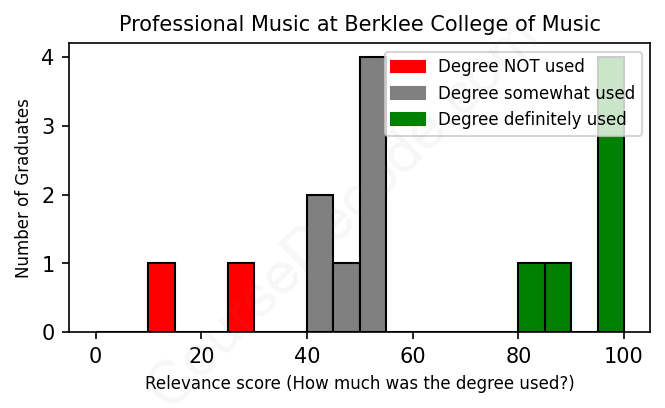
First, some facts. Of the Professional Music graduates from Berklee College of Music we've analyzed , here's how many have used (or NOT used) their degree in their career:

These are estimates based on AI analysis of 15 LinkedIn profiles (see below).
The verdict? Slightly below average. Overall, with an average relevance score of 62%, Professional Music graduates from Berklee College of Music have a slightly lower likelihood (-5%) of finding work in this field compared to the average graduate across all fields:
And for comparison, here's the chart for all profiles we've looked at across all degrees.
Also, after graduating, only 20% of these graduates have pursued further education other than another Bachelor's degree (such as a Masters degree or other), compared to the average across all profiles of 35%. This suggests a Bachelors degree is enough for most Professional Music graduates, and it's normal to look for work straight after graduation.
See the details:
|
Relevance score: 10% We think this person has NOT gone into a career related to their degree. We think this person has NOT gone into a career related to their degree.
DEGREE INFOGraduated in 2015 from Berklee College of Music with a Bachelor's degree in Professional Music. No other secondary education since. JOB HISTORY SINCE GRADUATIONSales Process Coordinator Music & Arts Oct 2016 - Oct 2017 Construction Specialist  Music & Arts Oct 2017 - Nov 2020 Operations Program Administrator  LandCare LLC Nov 2020 - Sep 2021 ABOUTNo information provided. |
The top 10 most common jobs done by the graduates we've analyzed (ranked most common to least) are:
When looking through the job profiles of Berklee College of Music graduates, it becomes clear that many have ventured into a variety of roles after finishing their degrees. A good chunk of these positions are directly related to music, such as sound designers, touring artists, and music instructors. For instance, roles like founder and audio engineer at Rawhide Records or music instructor positions require strong musical foundations and skills that align closely with what students learn in their Professional Music programs. It’s cool to see folks really applying their musical talent in professional settings, especially where sound design and teaching come into play.
However, there are quite a few graduates who end up in roles that don’t directly connect to music. Jobs like grant writers, marketing interns, and even bartenders are not utilizing the specific musical training they received. While some of these roles might benefit from skills like communication and creativity that are also part of the music curriculum, they simply don’t focus on music itself. So, while there’s a solid presence of graduates thriving in music-related jobs, there’s also a notable number who have taken paths that seem a bit detached from the professional music scene. It's a mix of creative passion and practicality, I guess!
Here is a visual representation of the most common words in job titles for Professional Music graduates (this is across all Professional Music graduates we've analyzed, not just those who went to Berklee College of Music):

Looking at the career trajectories of Berklee College of Music graduates, it seems like there’s a mix of success and some paths that veer far from music-related careers. Right after graduating, many of the alumni are diving straight into roles that keep them connected to music, such as sound engineers, instructors, or even running their own record labels. For instance, some graduates have taken up positions like Audio Engineer, Music Instructor, or even started their own projects, which shows a strong link to their degree in Professional Music. Others have managed to secure internships in marketing and PR at notable music companies, which illustrates a strategic approach to breaking into the industry.
However, after about five years, the picture gets a bit mixed. While some folks are still thriving in the music scene—like those who are self-employed musicians or running their own record labels—others have taken on jobs that seem quite distant from their degree. For example, working in various non-music roles, like bartending or managing accounts in other industries, suggests that not everyone is fully utilizing their education. Fast forward ten years down the line, and while a few graduates maintain their music-related careers, many others have drifted into roles that could be in totally different fields. So, overall, while there are definitely some notable success stories in the music industry, there’s also a significant number of grads who have found themselves in unrelated jobs. It’s a mixed bag, and it really highlights how challenging a career in music can be!
Getting a Bachelor degree in Professional Music at Berklee is definitely on the challenging side, but it’s also super rewarding if you’re genuinely passionate about music. You'll be diving deep into not just performance, but also music theory, songwriting, and a range of other skills that can get pretty complex. Berklee has a reputation for pushing students hard, so don’t expect it to be a walk in the park. That said, if you're committed and love what you’re doing, it can feel manageable and even fun at times. Just be prepared to put in the work, practice a lot, and stay on top of your projects, because it’s all about honing your craft and making the most of your time there!
Most commonly, in the LinkedIn profiles we've looked at, it takes people 3 years to finish a Bachelor degree in Professional Music.
So, looking at these Berklee grads, it seems like they’ve had a pretty mixed bag when it comes to making decent money. Some of them are doing cool gigs like running their own record labels, touring as artists, or working as sound engineers, which definitely has potential for better pay if they hit it big or build a solid reputation. However, we also see quite a few folks taking on teaching or coordinator roles that might not be very lucrative. A lot of them are freelancing, but that can be super variable, depending on how much work they get. Overall, while some of these grads might be making decent cash, others might be struggling a bit more to make ends meet in the music world.
Here is a visual representation of the most common words seen in the "about" section of LinkedIn profiles who have a Bachelor degree in Professional Music (this is across all Professional Music graduates we've analyzed, not just those who went to Berklee College of Music). This may or may not be useful:

Here are all colleges offering a Bachelor degree in Professional Music (ordered by the average relevance score of their Professional Music graduates, best to worst) where we have analyzed at least 10 of their graduates:
| College | Score | Count |
|---|---|---|
 Berklee College of Music Berklee College of Music
|
62 | 15 |